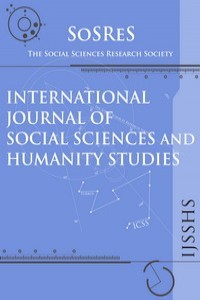THE YOUNGSTERS FINANCIAL CONSCIUSNESS BASED ON THE RESULTS OF A QUESTIONNAIRE RESEARCH
THE YOUNGSTERS FINANCIAL CONSCIUSNESS BASED ON THE RESULTS OF A QUESTIONNAIRE RESEARCH
financial knowledge consciousness, financial education, risk taking,
___
- Allen, F. – Babus, A. – Carletti, E. (2009): Financial Crisis: Theory and Evidence, downloaded: 2013.01.22.
- Borzán, A. (2010): A pénzügyi főiskolai, valamint a pénzügy és számvitel alapszakos képzés megítélése a hallgatói vélemények tükrében. Körös Tanulmányok, Szent István Egyetem Gazdasági Kar, Békéscsaba, 6-13. p. ISSN 1589-908-X
- Claessens, S. –Dell’Ariccia, G. –Igan, D. –Laeven, L. (2009): Lessons and Policy Implications from the Global Financial Crises, IMF Working Paper WP/10/44, http://www.imf.org/external/pubs/ft/wp/2010/wp1044.pdf, 2012.11.24. 2010, International Monetary Fund, downloaded:
- Fodor, M. – Fürediné Kovács, A. – Horváth, Á. – Rácz, G. (2011): Consumer behaviour, Perfekt Publishing House, Budapest (Hungarian)
- Kovács, E. (2004): Pénzügyi adatok statisztikai elemzése – egyetemi tankönyv, Tanszék Kft, Budapest,
- Lazányi, K. (2013): Mi áll a munkaerő-piaci kereslet és kínálat kiegyensşlyozatlanságának hátterében?: A közgazdászok helyzetének bemutatása, Munkaügyi Szemle 57:(3) pp. 50-62.
- Lazányi, K. (2012): Study for nothing? Literature overview of labour market opportuniti es for individuals with tertiary education, FIKUSZ 2012 : Symposium for young researchers: Proceedings, Budapest: Óbudai Egyetem, 2012. pp. 37-46.
- Lentner, Cs. – Szigeti, C. – Borzán, A. (2011): New Dimension of Banks Social Responsibility, In: Szente V, Szendrő K, Varga Á, Barna R (szerk.) Abstracts of the 3rd International Conference of Economic Sciences: Sustainable Economics - Community Strategies, Kaposvár, Hungary, 2011.05.19-.20.University of Kaposvár ,
- Nagy, O. – Jäckel, K. (2009): Is there trust towards professional financial consultancy as a service in Hungary? Research of the financial customs of Hungarian population, “Szakmai füzetek”, (Professional Booklets)26. issue, http://elib.kkf.hu/szakmaifuzetek_elemei/Page830.html (Hungarian)
- Sahlman, W.A. (2009): Management and the financial crisis, Harvard Business http://www.hbs.edu/faculty/Publication%20Files/10-033.pdf, downloaded: 2013.01.14. School Working Paper,
- Simai, M. (2009): The causes and potential consequences of the present global crisis, “Köz-gazdaság”, 2009/1. issue, pp.13-24 (Hungarian)
- Soros, Gy. (2009): The credit crisis of 2008 and its consequences, Scolar Kiadó, Budapest. (Hungarian)
- Hungarian National Bank (2012): Where do we stand in the world? Domestic financial culture reflected by an international study, Background material,http://www.mnb.hu/Root/Dokumentumtar/MNB/Sajtoszoba/Sajtos zobakozlemenyek/mnbhu-sajtokozlemeny-20120619- pk/PK_Hatteranyag_20120619.pdf, downloaded: 2012.03.19. (Hungarian)
- OECD (2005): Improving Financial Literacy, Analysis of Issues and Policies, ftp://ftp.fsb.co.za/public/Consumer%20Education/Presentations/2005_Impr oving_Financial_Literacy.pdf, downloaded: 2013.02.06.
- Başlangıç: 2009
- Yayıncı: Sosyal Bilimler Araştırmaları Derneği
PERCEIVED CAUSES OF POVERTY OF THE POST-APARTHEID GENERTION
Diana Joan Viljoen, Nokwanda Maseko
ágnes CSİSZÁRİK-KOCSİR, Mónika Fodor, András Medve
NATIONAL HISTORICAL EVENTS IN IRANIAN COLLECTIVE MEMORY
Hamid Ebadollahi Chanzanagh, Fatemeh Yazdan Ashouri
THE YOUNGSTERS FINANCIAL CONSCIUSNESS BASED ON THE RESULTS OF A QUESTIONNAIRE RESEARCH
ágnes CSİSZÁRİK-KOCSİR, Mónika FODOR, András MEDVE
A RESEARCH ON THE POPULATION IMMIGRATING INTO CITIES OF SÖKE AND ÖDEMİŞ
İclal Kaya Altay, Kumru Çılgın
Christina Geoffrey Mandara, Anke Niehof, Hilje van der Horst
EUROPEAN UNION INTEGRATION OF MACEDONIA: NEGOTIATION FOR MEMBERSHIP
DETERMINING THE FACTORS THAT INFLUENCE FEMALE UNEMPLOYMENT IN A SOUTH AFRICAN TOWNSHIP
